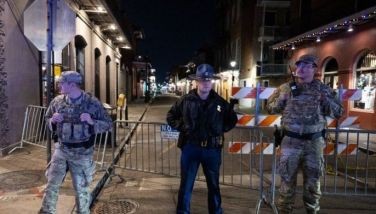Dominicans expel 244 Haitians over border killings
PORT-AU-PRINCE, Haiti — The Dominican Republic expelled at least 244 Haitians after an elderly Dominican couple was slain in an apparent burglary near the border between the two countries and a mob retaliated by killing a Haitian man, two migrant advocates said Sunday.
The Rev. Antoine Lissaint of Haiti's Jesuit Refugee and Migrant Organization told The Associated Press that a group of Dominicans killed the man because they blamed people of Haitian descent for the fatal stabbing of the couple.
Dominican police issued a statement saying Jose Mendez Diaz and Luja Encarnacion Diaz, both 70, were killed during an apparent home burglary in which the killers got away with two sacks of coffee. Detectives found a knife and stick at the scene.
There was no comment from the Dominican government.
A group of Haitians who had been living in the southwestern Dominican town of Neiba the past several years sought refuge at a police station because they feared further reprisals, Lissaint said. Police handed the group over to soldiers who drove them to the border and expelled them to Haiti on Saturday.
Migrant advocates said some of the people sent out of the Dominican Republic were eager to leave because they feared there would be more mob violence.
Haiti and the Dominican Republic have a long history of acrimony as neighbors on the Caribbean island of Hispaniola. But relations between the two have worsened since a Dominican court decision in September threatened to revoke citizenship for residents of the Dominican Republic of Haitian descent.
Jean-Baptiste Azolin, deputy coordinator for the Support Group for Repatriates and Refugees, said not all the people who were repatriated were picked up at the police station.
"Some of them were caught in the streets, with their children, and were sent to Haiti — like that, without anything," Azolin said.
Workers for the Haitian government's National Office of Migration greeted the expelled Haitians and others of Haitian descent, many of them mothers with their children, including a 3-day-old boy. They were taken to a shelter north of the capital, Port-au-Prince, where they received food. They were also each given the equivalent of $22 to help them return to their former Haitian towns.
"Some people (here) have their children in the Dominican Republic, and they don't know where they are," Fritz Jimani, one of the deported people, said in Spanish.
Azolin, who was at the shelter, said the actual number of people who were deported, and were eager to leave the Dominican Republic because of fears of mob violence, could be more than the 244 initially reported. He said 252 people had showed up at the shelter claiming to be among those expelled and there was a report that a Dominican bus carrying 75 more deportees was en route to the border.
The Haitian government objected to the deportation. Salim Succar, an adviser to Prime Minister Laurent Lamothe, said in an email: "We have taken certain measures to welcome these people ?and disapprove of the way this repatriation was done."
Human rights advocates say the Dominican citizenship ruling could disenfranchise more than 200,000 people, many of whom have lived there for years or decades, stripping them of the documents they need to work and attend school and denying them passports needed to travel overseas.
The Dominican government announced Friday that it has developed a plan to resolve the legal status of people who could lose their citizenship because of the ruling. Details are to be released once a decree is signed and takes effect in the coming days.
- Latest
- Trending
































